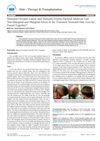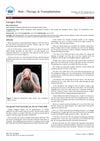Search
for
Sort by
Research
930-960 / 1000+ results
research Gender Disparity Among Renal Transplant Recipients Receiving Immunosuppressive Therapy
Women and men experience different quality of life and symptom distress after kidney transplant with immunosuppressive therapy.

research Stem Cells of the Hair Follicular Tissue: Application in Cell-Based Therapy for Vitiligo
Hair follicle stem cells could be used to treat the skin condition vitiligo.

research Impact of Stem Cell-Based Therapy and Platelet-Rich Plasma in Hair Loss and Telogen Effluvium Related to COVID-19
Stem cell and platelet-rich plasma therapies show promise for COVID-19 related hair loss, but more research is needed.

research Etiopathogenesis of Alopecia Areata
Alopecia Areata is an autoimmune condition causing hair loss, influenced by genetics, environment, and possibly improved by anti-MIF therapy, with many patients experiencing regrowth within a year.

research Cosmetic Procedures in the Treatment of Alopecia
Some cosmetic procedures show promise for treating hair loss, but more research is needed to confirm their safety and effectiveness.

research Transplantation of Melanocyte Stem Cells in Vitiliginous Skin
Transplanting melanocyte stem cells from hair follicles can effectively treat vitiligo.

research Oxidative Stress: Insights into the Pathogenesis and Treatment of Alopecia
Hair loss can be caused by stress, aging, and harmful substances that create an imbalance in the body's natural processes.

research Limited Effectiveness of Platelet-Rich Plasma Treatment on Chronic Severe Alopecia Areata
Platelet-rich plasma treatment is not very effective for chronic severe alopecia areata.
research Treating Alopecia Areata: Current Practices Versus New Directions
New treatments like JAK inhibitors show promise for reversing alopecia areata.

research Hair Mesotherapy: A Non-Surgical Procedure for Hair Loss
Hair mesotherapy might help with certain types of hair loss but lacks strong scientific proof and has some risks.

research Acceleration of Hair Growth Rate by Topical Liposomal Cepharanthine in Male Androgenetic Alopecia
Liposomal cepharanthine lotion speeds up hair growth in men with early balding.

research Neonatal Occipito-Linear and Temporo-Fronto-Parietal Alopecia: Can Non-Marginal and Marginal Forms of Transient Neonatal Hair Loss Be Found Together?
A baby boy had two types of temporary hair loss at birth, which might be two forms of newborn hair loss combined.

research The Effect of Platelet-Rich Plasma on Hair Regrowth in Patients with Alopecia Areata Totalis: A Clinical Pilot Study
PRP did not significantly regrow hair in alopecia areata totalis patients.

research Human Hair Follicle: An Update on Biology and Perspectives in Hair Growth Disorders Treatment
New treatments for hair growth disorders are needed due to limited current options and complex hair follicle biology.

research Treatments for Moderate-to-Severe Alopecia Areata: A Systematic Narrative Review
Some treatments for severe hair loss work but often have side effects, with baricitinib showing the most promise.

research A New Era of 5α-Reductase Inhibitors for Androgenetic Alopecia
New drug dutasteride effectively treats hair loss, but use cautiously due to potential sexual side effects.

research George's Story
Hair restoration greatly improved George's confidence and self-identity.

research The Role of Botanical Products in the Treatment of Alopecia
Some botanical products may help increase hair growth in people with alopecia, but more research is needed.

research Diagnostic Modalities in Trichology: An Update
New hair and scalp disease diagnosis methods are important for correct treatment.

research Innovative Method of Alopecia Treatment by Autologous Adipose-Derived SVF
The document concludes that using a person's own fat cells (SVF) can significantly increase hair thickness and density, suggesting it could be a promising treatment for hair loss.

research Estimation of Serum Ferritin Level in Female Patients with Telogen Effluvium
Low serum ferritin levels are not closely linked to telogen effluvium in women.

research The Novel Excipient, Dodecyl-2-N, N-Dimethylaminopropionate Hydrochloride (DDAIP-HCl) Improves the Flux of Minoxidil in Human Skin
DDAIP-HCl significantly increases minoxidil absorption into the skin.

research Androgens and Hair: A Biological Paradox with Clinical Consequences
Androgens can both increase body hair and cause scalp hair loss.

research Comparison of Efficacy of Autologous Platelet Rich Plasma Therapy With 5% Topical Minoxidil Spray in Treating Alopecia Areata: A Head-to-Head Assessment of Novel Approaches
Monthly PRP therapy is more effective than daily minoxidil for alopecia areata.

research Hair Follicle Germs Containing Vascular Endothelial Cells for Hair Regenerative Medicine
Adding human blood vessel cells to hair follicle germs may improve hair growth and quality.

research Androgens and Hair: A Biological Paradox
Androgens can cause hair growth in some areas but hair loss on the scalp.

research Anagen Hair Follicles Transplanted Into Mature Human Scars Remodel Fibrotic Tissue
Transplanting growing hair follicles into scars can help regenerate and improve scar tissue.

research Modeling Chemotherapy-Induced Hair Loss: From Experimental Propositions Toward Clinical Reality
A new model using mice with human hair follicles helps better understand hair loss from chemotherapy.

research Introductory Chapter: Hair Loss
The document explains the causes, types, diagnosis, and treatments of hair loss, and its psychological impact, especially on women.